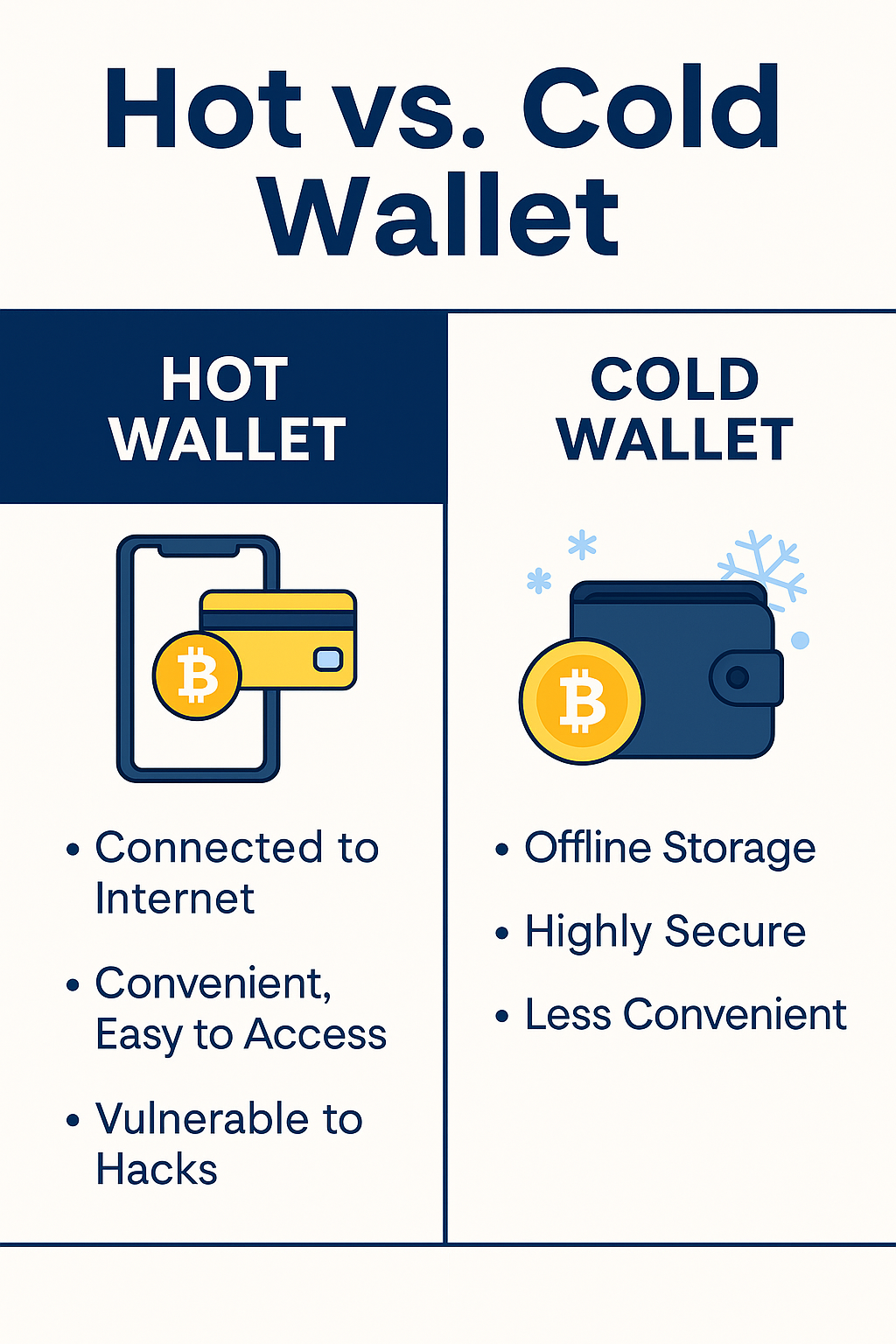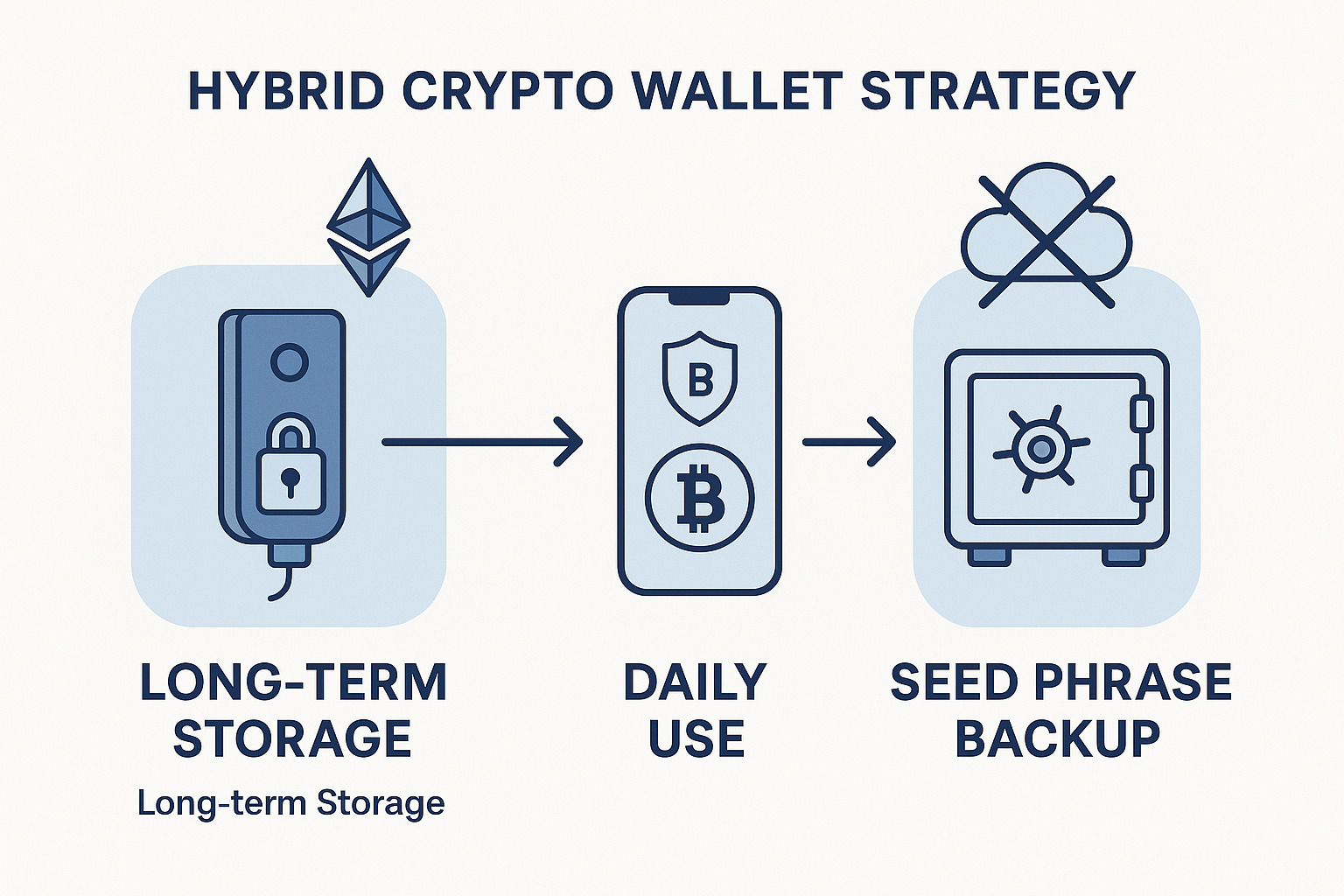Cryptocurrency is no longer just a niche asset class—it’s now part of millions of portfolios worldwide. But with increased adoption comes increased risk. In 2025, as crypto hacks grow more sophisticated and regulatory pressure increases, wallet security has never been more important.
Whether you’re a HODLer, a DeFi user, or just starting your crypto journey, this guide will help you understand the safest wallets available in 2025—hot vs cold—and how to choose the best option for your needs.
Why Wallet Security Matters More Than Ever in 2025
Crypto Thefts Are Still Rising
Despite better protocols, 2024 saw over $2.6 billion in crypto thefts, much of it due to compromised wallets, phishing, or poor storage practices. Even prominent influencers and seasoned investors were victims, proving that no one is immune.
Exchanges Are Still Not Wallets
FTX, Celsius, and others have proven that storing crypto on centralized exchanges is risky. These platforms may freeze withdrawals, become insolvent, or get hacked. Self-custody is the only way to truly control your assets and avoid being caught in a collapse.
Secure Wallet = Peace of Mind
Without proper storage, your crypto can be gone forever. Strong wallet security ensures access, protection from hackers, and resilience against phishing attacks. With the rise of deepfake scams and wallet-draining malware, having a hardened setup is no longer optional.
Hot Wallets vs Cold Wallets — What’s the Difference?

What Is a Hot Wallet?
Hot wallets are connected to the internet. They’re ideal for frequent transactions and quick access. Think of them as your digital checking account.
Examples: MetaMask, Trust Wallet, Coinbase Wallet
Pros:
- Convenient for trading & DeFi
- Free or low-cost
- Easy mobile access
- Fast setup and integration with Web3 platforms
Cons:
- Vulnerable to hacks, malware, and phishing
- Always online = always exposed
- Targeted by fake browser extensions and mobile app clones
What Is a Cold Wallet?
Cold wallets are offline storage methods that are not connected to the internet. These include hardware wallets and paper wallets. Cold wallets are like a vault—ideal for assets you don’t need to access frequently.
Examples: Ledger Nano X, Trezor Model T, SafePal S1
Pros:
- Top-tier security
- Resistant to online threats
- Ideal for long-term storage
- Recovery options in case of device loss
Cons:
- Costs $50–$300+
- Less convenient for frequent access
- May require technical literacy to set up securely
Which Is Safer?
Cold wallets are significantly safer for long-term holding. For traders and small holdings, hot wallets offer ease—but with more risk.
Pro Tip: Many investors use both—hot wallets for daily use, cold for vault-like storage.
Top 5 Cold Wallets for Maximum Security (2025)
1. Ledger Nano X
- Security: Certified Secure Element chip, encrypted Bluetooth
- Supports: 5,500+ coins
- App: Ledger Live
- Pros: Mobile support, sleek UI, supports staking
- Cons: Requires trust in Ledger firmware updates, recent cloud recovery controversy
2. Trezor Model T
- Security: Open-source firmware, no wireless connections
- Supports: 1,400+ coins
- Features: Touchscreen, passphrase entry, open-source bootloader
- Pros: Privacy-friendly, customizable security settings
- Cons: Bulkier and more expensive than Ledger
3. Keystone Pro
- Security: Fully air-gapped, QR-code transfers only
- Features: Fingerprint scanner, secure element
- Pros: Open-source, no Bluetooth/USB risks, supports multisig
- Cons: Setup may feel complex for beginners
4. SafePal S1
- Security: Air-gapped, uses QR code signing
- Pros: Affordable, supports NFTs and DeFi protocols, mobile app is intuitive
- Cons: Plastic build, limited native integrations
5. Tangem Wallet
- Design: Credit-card-shaped NFC wallet
- Security: No batteries, no cables, water-resistant
- Pros: Travel-friendly, no need for seed phrase (2+ card backup)
- Cons: Requires smartphone NFC, limited desktop support
Comparison Table: (Insert image/table here)
| Wallet | Security Rating | Price Range | Coin Support | Best For |
|---|---|---|---|---|
| Ledger Nano X | ⭐⭐⭐⭐⭐ | $149 | 5,500+ | Long-term investors |
| Trezor Model T | ⭐⭐⭐⭐☆ | $179 | 1,400+ | Privacy advocates |
| Keystone Pro | ⭐⭐⭐⭐☆ | $129 | 2,000+ | Security maximalists |
| SafePal S1 | ⭐⭐⭐⭐ | $49 | 10,000+ | Budget holders |
| Tangem | ⭐⭐⭐ | $60 | Limited | Travel use |
Most Trusted Hot Wallets in 2025
1. MetaMask
- Ideal for DeFi & Ethereum-based tokens
- Browser + mobile extension
- Supports hardware wallets (Ledger, Trezor)
- Custom RPC support for multiple chains
2. Trust Wallet
- Binance-owned and well maintained
- Supports 70+ blockchains and DApps
- Easy staking, NFT gallery, and wallet connect
3. Exodus
- Sleek desktop & mobile wallet
- Integrates with Trezor for hybrid security
- Built-in exchange, staking, and portfolio tracking
4. Coinbase Wallet
- Self-custodial (not the same as Coinbase.com exchange)
- NFT marketplace access
- Easy setup for beginners, strong UI
5. Rabby Wallet (New in 2025)
- Ideal for multi-chain DeFi
- Security-first browser wallet with transaction simulation
- Prevents blind signing & warns of suspicious contracts
Tip: Always write down your 12–24 word seed phrase on paper and store it offline—never on a phone, email, or cloud.
Comparison Table: Most Trusted Hot Wallets in 2025
| Wallet Name | Best For | Key Features | Supported Assets | Security Highlights |
|---|---|---|---|---|
| MetaMask | DeFi & Ethereum users | Browser/mobile, DeFi integration, hardware support | ETH & EVM chains | Seed phrase, password, hardware wallet pairing |
| Trust Wallet | Mobile-first users | Multi-chain, staking, NFTs, user-friendly UI | 70+ blockchains | Seed phrase, biometric login, owned by Binance |
| Exodus | Beginners & portfolio | Desktop/mobile, built-in exchange, staking | 300+ assets | Seed phrase, Trezor integration, AES encryption |
| Coinbase Wallet | Beginners & NFT users | NFT marketplace, simple UI, Web3 DApp access | Major tokens + NFTs | Seed phrase, Coinbase 2FA account protection |
| Rabby Wallet | Multi-chain DeFi users | Browser-based, transaction simulation, DeFi alerts | EVM + multi-chain | Simulated signing, phishing warnings, open-source |
Choosing the Right Wallet for You
Ask yourself:
- How often do I trade or use crypto?
- Daily = Hot wallet
- Rarely = Cold wallet
- How much is at stake?
- $2,000? Consider a hardware wallet
- Am I using NFTs, staking, or DeFi?
- MetaMask or Trust Wallet may suit you
- Do I travel often or want mobile-first access?
- Consider Tangem or SafePal
Hybrid Strategy: Best of Both Worlds

Use:
- A cold wallet (e.g., Ledger or Trezor) for long-term holdings
- A hot wallet (e.g., MetaMask) for active trading
- Separate devices for storage and transactions (e.g., laptop for cold, phone for hot)
- Fireproof safe or safety deposit box for recovery backups
Wallet Security Tips (Applies to All Types)
- Backup seed phrases in multiple secure, offline locations
- Enable 2FA and anti-phishing codes
- Never share your private keys or seed phrases—ever
- Beware of phishing emails, fake apps, and browser extensions
- Only buy hardware wallets from official websites or verified resellers
- Regularly check for firmware and app updates from trusted sources
- Avoid public Wi-Fi when using mobile wallets
- Consider using multisig wallets for large balances
Final Verdict: Protecting Your Crypto in 2025
The safest crypto wallet is the one that fits your lifestyle and your security priorities. If you’re holding serious value, you need more than just convenience—you need control, resilience, and offline protection.
For long-term storage, cold wallets like Ledger Nano X, Trezor Model T, and Keystone Pro are unbeatable in terms of security. If ease of use or DeFi is a priority, MetaMask, Exodus, or Trust Wallet are excellent—but use them with caution.
Don’t wait until it’s too late. Your crypto is only as safe as your wallet setup.
Take Action Today:
- Buy a hardware wallet from Ledger or Trezor (affiliate link here)
- Set up a secure hot wallet for DeFi convenience
- Move long-term holdings off exchanges to self-custody
- ️ Apply the wallet security tips above
Frequently Asked Questions (FAQs)
Q: What happens if I lose my cold wallet device?
A: You can recover your funds using the seed phrase. That’s why securely backing it up offline is crucial.
Q: Can I use more than one wallet?
A: Yes. Many users keep multiple wallets for different use cases (DeFi, HODLing, NFTs).
Q: Is MetaMask safe?
A: MetaMask is safe if you protect your device, backup your seed phrase, and watch for phishing. For larger amounts, pair it with a hardware wallet.
Q: What’s the best wallet for beginners?
A: Coinbase Wallet or Trust Wallet offer easy setup and user-friendly interfaces.
